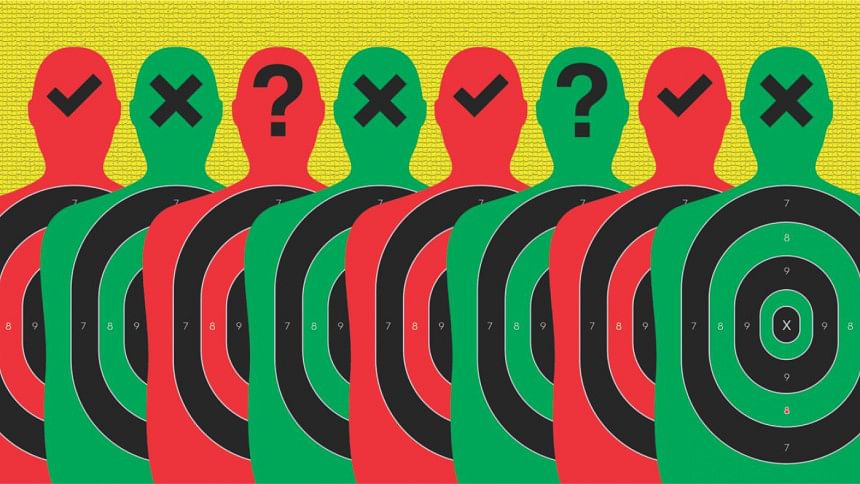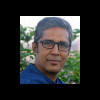The Other Radical

The number of militancy cases filed each year go into the hundreds—way more than the handful of combat operations we have seen. Not every one of the people arrested are hiding semi-automatics under their beds. Some of them conduct their jihad on social media, absorbing and spreading radical ideology—and this story is about one such person. How does one get radicalised through Facebook?
This incident happened on January 27 last year. The motorbike was zipping through the dark and the road I took was one that split the vast haor (wetland) into two parts. The wind bit through my thin jacket sending a chill down to the bones. There was hardly anyone on the road that time of the night. I was heading for the northeastern Kishoreganj district, hoping to meet a suspected Islamic State operative, whom the police had picked up about an hour ago.
Twenty-year old Abdul Hadi was staying at a tin-shed house in Madhabdi pourashabha of Narsingdi. Plain-clothes members of the Kishoreganj police stormed into the house and took him into a microbus, before anybody could even get a whiff of what was actually going on. Blindfolded, he was being taken to Kishoreganj, as I followed on a motorbike.
The seven-minute operation was painstakingly planned. A senior police officer worked and gathered information for several weeks before deciding to detain Hadi, a young man from Kurigram who went to a madrasa after finishing primary school. Police came to learn about his radical linkage through monitoring suspected Facebook accounts.
The suspect wrote a status on his Facebook wall, praising those who carried out the attack at the Holey Artisan bakery in Gulshan on July 1, 2016. He was also sharing materials that could get others radicalised. Further police monitoring revealed he was one of the administrators of a secret Facebook group “Islamic State: Dawla al Islamia”. This was one of the numerous secret groups that actively spread radical ideology among youths.
The night before, on January 26, a source in the police department informed me about a raid to detain an IS follower in Madhabdi, some 100 kilometers from the capital city. I got in touch with the cyber specialist helping the police to nab the suspect. Tracking the suspect's mobile phone, the specialist found his movement in the Madhabdi area but did not know the exact location. So, he decided to go to Madhabdi to trace him.
I went along in order to better understand how the police arrest a suspected militant. I was thinking about meeting the suspect, and if possible, talking to him to know about his past and how he was motivated to take the deadly path of radicalisation.
That day before evening, we headed for Madhabdi, taking the short cut. After about 50 minutes, we stopped at a roadside hotel where we waited for the police team. Madhabdi was just a few kilometers away. “There was no doubt about his involvement in radical activities. To me, he is not a big fish but radical enough to be persuaded to go on a militant mission,” the specialist shared while sipping a cup of tea. Ruling party lawmaker Liton in Gaibandha was assassinated on New Year's Eve in 2016 and police suspect Hadi might have a link with the killing. The police believed his arrest could resolve the high-profile murder.
The officer and his team arrived in a microbus but wasn't happy seeing a stranger. They sat together with a laptop to trace the suspected militant's location. The specialist spotted him and we started for Madhabdi police station. They decided to take the support of the local police who would know the area better. “We should not take any chances,” the officer told the specialist who nodded in approval.
After a discussion with the Officer-in-Charge of the police station and getting a better idea about the location of the suspect, the team leader wanted two police officers of the police station to accompany them and take them to the place of the suspect.
Hadi was inside his house when undercover police men stormed in around 9:00 pm. From the meagre belongings of the suspect stowed in a trunk were also some religious books and a diary. Police took him into the microbus, blindfolded him and left the area. By then locals had gathered in the area.
There was no scope to talk with the suspect as the microbus headed for Kishoreganj. I followed on the bike. By the time we reached Kishoreganj, after about two hours of journey through the dark isolated road, Hadi had fallen asleep at a house near the Kishoreganj Police Lines.
My wait lingered.
At night, I took the opportunity to go through his books and the diary. The books were religious but harmless. The diary revealed that Hadi had come to Madhabdi in 2010 to work at a factory. While he initially wasn't involved in militant activities, everything went wrong after he opened his Facebook account after three years. The diary in a sense was a document of his gradual path to radicalisation.
The next morning, I was allowed to meet Hadi, who was kept in a room blindfolded with his hands tied. He looked unbending initially but eventually talked about him and his family's hardship in Kurigram and how he came in contact with militants in Narsingdi and was even dreaming to travel to Syria to join jihad.
Abdul Hadi was not born as a militant. Born in a poor family in the country's impoverished area Ulipur of Kurigram, the 20-year old youth never thought of anything like that. Harsh social reality and a support group he found online turned him into a diehard radical.
The following is an excerpt of my interview with him:
What is your name?
Mohammed Abdul Hadi.
Where are you from?
Daldali village in Ulipur upazila of Kurigram district.
Tell me something about your family.
My father Abdul Kashem had a modest house and some cultivable land in our village—all lost to river erosion in 2010. This pushed the entire family towards total uncertainty. We went to another village and started staying in my grandmother's house. My father could not earn bread for us.
How did your family survive?
Hardship in the family compelled my father, my elder brother and me to leave the village and look for work in other parts of the country.
Where are your father and elder brother?
My father is a security guard of a building in Gazipur while brother, Mohammed Ataur Rahman, is an imam of a mosque in Chouddagram of Comilla district. He also teaches at a qwami madrasa in the area.
(The police later told me that his elder brother Ataur Rahman was the primary reason behind Hadi becoming a radical. Ataur, a teacher of Chhadrul Ulum Islamia Qwami Madrasa, was picked up three days after his brother, from Chouddagram. Ataur himself opened his Facebook account somewhere between 2012 and 2014. He befriended many militant-minded radicals from the madrassa where he taught, among others. As told by the police, Ataur's facebook friends added Hadi online. Hadi was then exposed to the concept of jihad.)
Are you married?
Yes. I got married so that my wife could help my ailing mother and also look after my two younger brothers who live with my mother in the village.
Is your elder brother married?
No. He wants to study. He does not want to get married now. This is why my family got me married.
When did you open a facebook account?
I opened it about one-and-half years ago.
How did you give the status applauding the Gulshan café attack?
(He was silent. As if he was trying to remember what attack I was asking about.) Yes. Yes, I remember. I was working at the factory that night. I went home late and slept. The next morning I came to know about the attack from an online news. All the people in the house, around me, were talking about the attack.
You gave the status immediately after the news of the attack went to the media? Why did you delete the status later?
I gave the status but deleted it fearing I might be in trouble.
How do you become an admin of the secret Facebook group Banglay Khelafat Chai?
(Banglay Khelafat Chai which translates to We Want Khilafat in Bangladesh, is a large platform having nearly 8,000 members. This is one of the secret groups that constantly share radical documents, articles, songs, videos and incite Islamic sermons that slowly radicalise members)
There is a Facebook ID, Mujahider Somorthok Abdullah, with whom I chat online although I never met him. We discussed about not giving any indecent post in this group. He made me admin. I said I knew nothing about social media but he said he would teach me how to run the group as an admin. I still don't know what to do in the group.
What do you want to do in future?
My only dream is to travel to Syria and join Jihad. But I don't have money or ability to go. My dream will be fulfilled if someone comes forward to help me with money and other papers. I am waiting for that day to come.
***
From the Madhabdi house, the police got a trunk with some religious books and two diaries written by Abdul Hadi. In the diaries (copies obtained by The Daily Star), he often pours his emotions through songs, poems and stories, often interspersed with random thoughts and notations, some of it plain gibberish. Yet a thorough reading reveals his slow radicalization. He writes against atheists, denounces women's rights and wishes to join jihad and have a martyr's death.

 For all latest news, follow The Daily Star's Google News channel.
For all latest news, follow The Daily Star's Google News channel. 



Comments